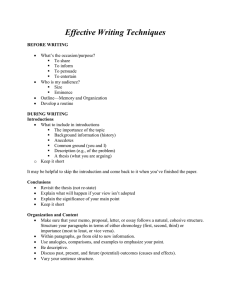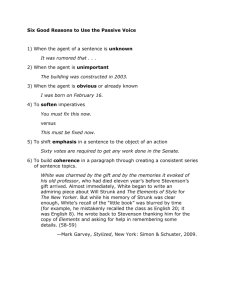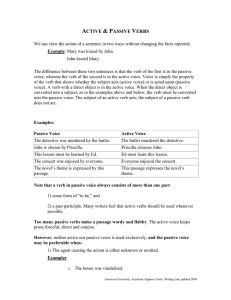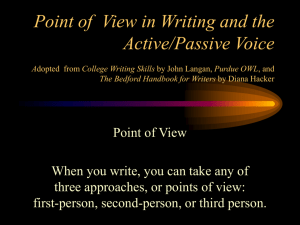Active Verbs that Describe “Work”
advertisement
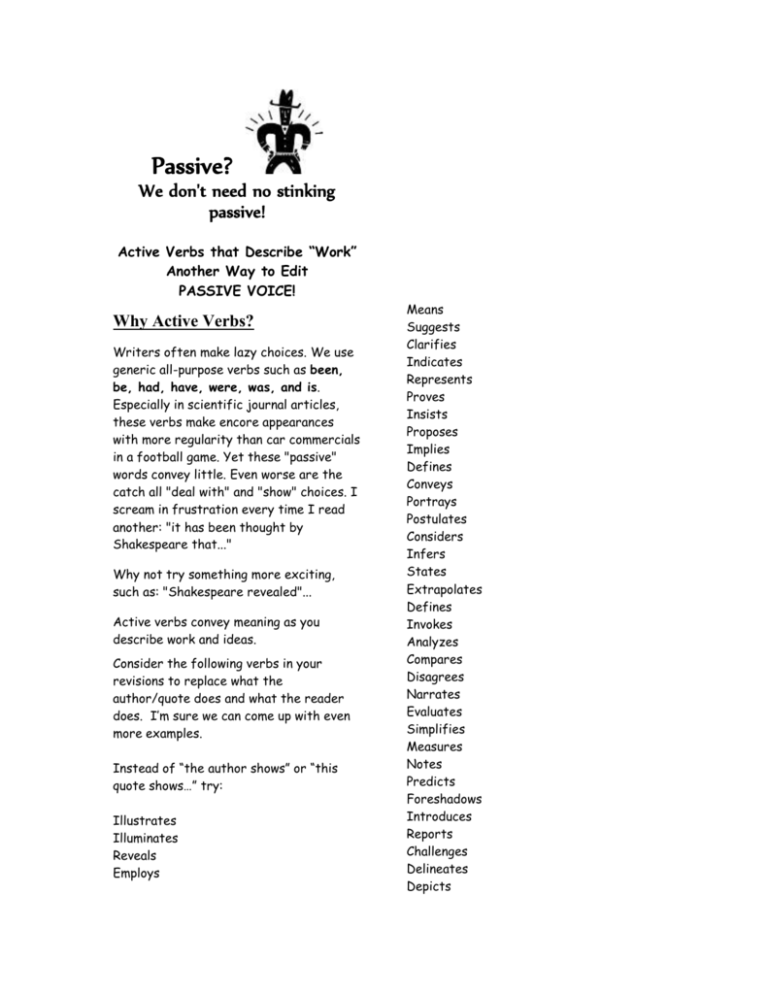
Passive? We don't need no stinking passive! Active Verbs that Describe “Work” Another Way to Edit PASSIVE VOICE! Why Active Verbs? Writers often make lazy choices. We use generic all-purpose verbs such as been, be, had, have, were, was, and is. Especially in scientific journal articles, these verbs make encore appearances with more regularity than car commercials in a football game. Yet these "passive" words convey little. Even worse are the catch all "deal with" and "show" choices. I scream in frustration every time I read another: "it has been thought by Shakespeare that..." Why not try something more exciting, such as: "Shakespeare revealed"... Active verbs convey meaning as you describe work and ideas. Consider the following verbs in your revisions to replace what the author/quote does and what the reader does. I’m sure we can come up with even more examples. Instead of “the author shows” or “this quote shows…” try: Illustrates Illuminates Reveals Employs Means Suggests Clarifies Indicates Represents Proves Insists Proposes Implies Defines Conveys Portrays Postulates Considers Infers States Extrapolates Defines Invokes Analyzes Compares Disagrees Narrates Evaluates Simplifies Measures Notes Predicts Foreshadows Introduces Reports Challenges Delineates Depicts Construes Interprets Provides Acknowledges Distinguishes Informs Specifies Determines Details Sums up Designates Points out Sets forth Deduces Derives Characterizes Guides Maintains Believes Speculates Presents Organizes Investigates Assesses Determines Calculates Supports Devises Evaluates Attributes Argues Reiterates Investigates Executes Provides How do I get rid of the Passive Voice? You can get rid of passive voice writing in one night. Well. Okay. It may take a little bit longer. But you can identify all of your targets in a few seconds. Step 1: Make your word processor show revisions. You will have to search for this choice in your word processes. For example, in Microsoft Word, revisions... is under "tools." You must select the show revisions option. Step 2: Use the "search and replace" ability of your program, by replace ^is^ with ^REPLACE ME^ (^ is my way of telling you to put in a space before and after the verb) replace ^was^ with ^REPLACE ME^ replace ^were^ with ^REPLACE ME^ replace ^had^ with ^REPLACE ME^ replace ^have^ with ^REPLACE ME^ replace ^get^ with ^REPLACE ME^ replace ^got^ with ^REPLACE ME^ replace ^be^ with ^REPLACE ME^ replace ^been^ with ^REPLACE ME^ replace ^deal with^ with ^REPLACE ME^ replace ^show^ with ^REPLACE ME^ replace ^any other passive verb your editor/teacher hates^ with ^REPLACE ME^ Step 3: Rewrite each sentence with an active verb. Passive sentences typically place the true subject at the end. Thus, you may need to turn the sentence backwards to destroy passive voice. Step 4: You can see all the changes at once by clicking off the show revisions option, or some programs allow you to accept or reject the changes one-by-one. Yet be careful! Each of these words infers specific individual, analytical meaning. When using this list, be sure to choose the best verb for a situation. For efficiency, accuracy, and your own credibility, always aim for the best and simplest verb. If you are unsure of meaning, be sure to look it up.



